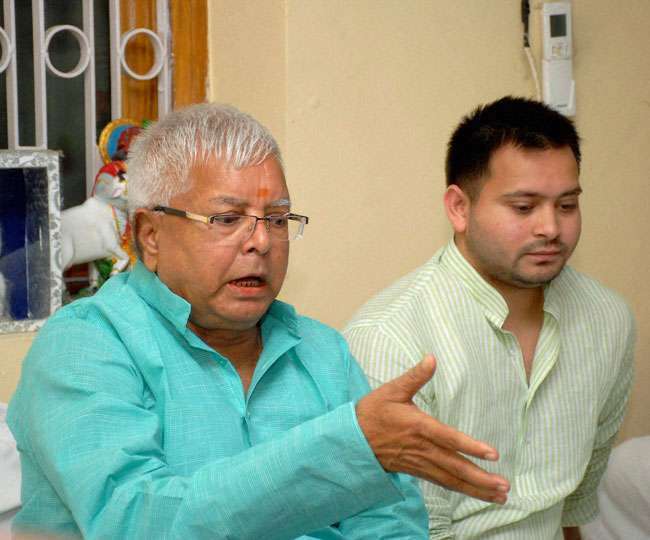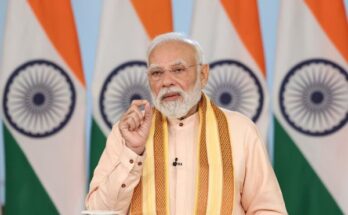
Law Kumar Mishra
Patna, November 5
Lalu Prasad had been elected member of Lok Sabha in March 1977 when he was 28 years old and his son, Tejashwi was attempting to achieve it at 30.
Lalu had polled 4.15 lakh votes -86 per cent of the total votes polled against his nearest sitting Congress MP Ramshekhar Prasad Singh who got 8 per cent (41600) of the votes polled.
Lalu was a candidate of Janata Party having Haldhar (plough on the shoulder of a farmer) as his symbol. Indira Gandhi had lifted the emergency on January 18 and announced fresh elections. Lalu was one of the 54 candidates nominated by JP in then undivided Bihar.
Lalu reached Mahendrughat in Patna to start his electoral journey to file nomination papers. He was accompanied by one of his Saalas, his old friend Jagdish Sharma, then a student of Veterinary Science.
The author was the fourth co-passenger on the steamer of the Railways that connected to Pahleja Ghat across the Ganga. They boarded the general class of the steamer. 25 paise was the ticket rate. There was no rail or road communication then as the nearest bridge over Ganga was at Mokamah, 150 kms away.
From Pahlejaghat to Sonepur to Chapra, a jeep which charged Rs 25 was hired. Lalu stayed at the residence of a JP movement activist Lal Babu Rai. Next day he filed his papers at the Collectorate and the campaign started. The daily fare of a taxi (Ambassador) was Rs 60.
He preferred an old jeep which was less expensive. He used to start his daily campaign by 10 am and end up after midnight. Lalu had become the household name in his constituency because of his association with the JP led movement. He had no major financier then and depended upon the small donations from rich farmers of the area, who included even supporters of the sitting Congress MP.
“We recollect, he preferred Sattu (then available for ten paise per plate) as his morning breakfast. Lunches were arranged by his supporters even in the remote villages. Dinner late in the night. He used big loudspeakers installed on the jeep to seek votes. He was careful in not keeping any one unhappy and obliged everyone by accepting their invitation for dinner,even after he had taken one earlier. Some rich farmers welcomed the campaign team with Curd full plates also,” the author recalled.
He was darling of all, members of all castes, including upper castes Rajputs though the Congress candidate was a Rajput. He never talked on caste lines then, but told his audience, how he was arrested, how he was kept in Bankipore jail, how a particular deputy SP chased him to arrest and even reminded the people that he was married recently and his wife was in her Maika (Lalu’s in-laws place)
He got support in Jaluva, Jalalpur, Bahora Tola, Amar Chapra, Ratanpur, Rasulpur across caste lines. He did not promise any new work to the area as he was himself not aware of the problems. He was quite particular to read the morning newspapers which came from Patna with Dak edition marks.
After receiving the certificate of election from Returning officer in the last week of March, Lalu took the same route to return to Patna via steamer. Coming out of the platform of Mahendrughat, Lalu opted for an Ambassador car to reach his Veterinary College residence, a peon’s quarter allotted to him as grade four employee. His elder brother too was a peon.
Next day, his rival who had lost the elections also came. He was staying with his son in Professors quarters of Veterinary College, while Lalu was in Peon’s quarters. Lalu made a courtesy call, took his blessings. Next morning he went to Patna Law College to seek blessings of the principal, B N Srivastava as the newly elected MP was still a student of LLB there. Tejashwi did not pursue studies after 9th standard
He brought in his wife from Sasural after “Gauna” rituals after he took oath as an MP, purchased a Vespa scooter and later a second hand jeep from Panagarh in West Bengal. Lalu had gone to New Delhi to take oath in Patna-Delhi express in a second class sleeper coach.
That was Lalu, unlike his son.
Tejashwi starts his day at 9 am to cover 16 to 18 places by helicopter to campaign from one corner to the other. One day, he addressed four meetings in Madhepura to seek votes for Suhasini, daughter of Sharad Yadav, who had once defeated Lalu in Lok Sabha elections.
Tejashwi is using helicopters to cover the entire state, avoids talking on controversial subjects, like reservations and promises one million jobs. He is refraining from attacking the BJP leaders of either Bihar or the Centre and even in his speeches makes reference to the PM with respect. He admits before the audience, he was quite young, without much experience, but will learn with the experiences of others.
While Lalu was not particular about his food habits, Tejaswhi is particular, never taking any food outside to keep himself active. His mother hands over home food before he takes off. His favourite election uniform is-white kurta-pyjama and a white gamcha (Towels), Lalu’s favourite was yellow coloured shirt, pyjama with wide open at the bottom and a big Khadi gamcha.
Lalu never talked of Social justice in his campaign in 1977, Tejashwi promised economic justice to the people as he claimed his father gave social justice as chief minister.
When elected as MP first, Lalu had told his supporters “I will be a leader bigger than Ramlakhan Babu” (Ramlakhan Singh Yadav was a senior Congress leader and most popular among the Yadavs). That was the ambition of Lalu then and his son is aiming to become chief minister now.



